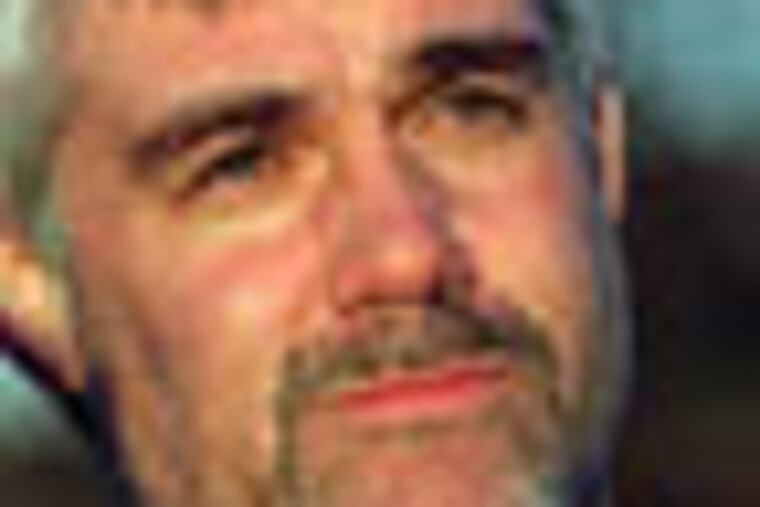Innocent after proven guilty
New project helps to right injustices

IN 2002 Bruce Godschalk was freed from a Montgomery County prison after DNA tests cleared him of raping two women.
He had spent 15 years in prison after being convicted in 1987 of the rapes, based largely on a detailed confession he gave to an Upper Merion Township police detective. Godschalk said at the trial that the statement had been coerced.
In 1995, Godschalk asked the Innocence Project at the Benjamin N. Cardozo School of Law, in New York, to represent him, and it did so with its attorneys and local attorney David Rudovsky.
The attorneys had to fight to get prosecutors to release DNA evidence collected at trial and to submit such evidence for testing.
It is cases such as Godschalk's that prompted the need for the Pennsylvania Innocence Project, founders of the new project say.
The project, an independent nonprofit organization based at Temple University, officially opened yesterday, and will investigate applications from statewide inmates in which there is a claim of factual innocence - that is, cases in which an inmate can be proven innocent by DNA or other evidence.
Marissa Boyers Bluestine, most recently of the Defender Association of Philadelphia, for which she worked as an assistant defender for more than 10 years, will co-run the project as its legal director. She starts on Monday.
Richard Glazer, chairman of the city's Ethics Board, serves as the project's executive director, and will work at the office part-time, focusing on administrative and policy issues.
Bluestine said that the office already had received about 40 letters from inmates around the state. Word, apparently, had spread in the prison population as of late last year that the local project was to open.
Every person who writes to the project will get a response, she said. If the inmate's case meets initial criteria, the office will send out a detailed application, which the inmate will have to fill out.
After receipt of the application, the project will then begin investigating the case and will determine whether to pursue the inmate's claims.
As part of the project's goals, Bluestine will also teach a class, the Pennsylvania Innocence Project Clinical, at Temple University's Beasley School of Law, starting in the fall. Students will receive an intensive introduction to post-conviction legal and investigative work. They will also work on some of the project's cases, as will volunteer lawyers.
The project plans to broaden its outreach to students at other universities as well, including Villanova, the University of Pennsylvania, Drexel and Widener.
And, Bluestine said that she expects to reach out to state legislators, police, prosecutors, social workers, lawyers, the religious community and others to try to get them involved in the project.
The local project was founded by David Richman, a partner at Pepper Hamilton, who is serving as president of its board of directors, and Rudovsky, who is vice president of the board, with the support of other lawyers.
Richman said that what got him thinking that Philadelphia needed an innocence project was a May 2006 talk by Bill Moushey at the annual meeting of the Pennsylvania Prison Society in Philadelphia.
Moushey, then a reporter at the Pittsburgh Post-Gazette and director of the Innocence Institute of Point Park University, in Pittsburgh, asked the audience why Philadelphia didn't have an Innocence Institute.
"That struck me as sort of a goad," Richman said. "Why don't we have one?"
Richman was also motivated to form a local project based on the "horror" of having "someone imprisoned for a crime they didn't commit." Also, he said that he had met other lawyers involved in innocence projects around the country and found the "sheer nobility" of these people to be awe-inspiring.
The original Innocence Project was created in New York in 1992 by Barry Scheck and Peter Neufeld. Since then, 51 other innocence organizations have been formed around the world, spokesman Eric Ferrero said.
The projects are independently run, but are loosely affiliated through the Innocence Network.
"It's almost hard to describe how much we wanted a local project" in Philadelphia, Ferrero said. "For years, the need for this work has been clear in Philadelphia and elsewhere in Pennsylvania."
Ferrero said that 234 inmates across the country have been exonerated by DNA evidence, including nine in Pennsylvania.
Both Richman and Rudovsky said that funding was key to getting the Pennsylvania Innocence Project on its feet. Start-up funds came from the Pennsylvania Commission on Crime and Delinquency, the Independence Foundation and from H.F. "Gerry" Lenfest.
Moushey is also excited that there is finally an innocence organization in Philadelphia. His project at Point Park is journalism-based (he works with journalism students) - as opposed to Philly's, which is a law-school-based project.
He called the new project "a win-win for everyone across Pennsylvania," and said that his "little meager operation . . . has been inundated by claims from people in Philadelphia for seven years." *